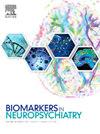HPA system in anxiety disorder patients treated with cognitive behavioural therapy: A review
Q2 Medicine
引用次数: 0
Abstract
Anxiety disorders (AD) have a complex etiology involving genetic, psychophysiological and environmental factors. Recent biomarker research in AD shows alterations in anatomical, biochemical and physiological pathways as well as in endocrinological processes. Perceived stress is one of the factors often reported in relation to the onset and the course of AD. Hence, the function of the hypothalamus-pituitary-adrenal (HPA) axis, the endogenous system regulating the stress response homeostasis, may serve as biomarker in disease etiology and response to treatment. Vice versa, successful treatment could have an advantageous effect on the function of the HPA system. In the present review, we summarize findings on the HPA system in relation to AD and first results on its modifiability in response to cognitive behavioral therapy (CBT), one of the most efficacious psychotherapeutic treatments for AD. We specifically focus on findings of experimental studies that explored cortisol levels before, during and after exposure-based CBT. A systematic search was conducted in MEDLINE/PubMed, PsycINFO, Web of Science, and in references of retrieved studies until April 2024. The inclusion criteria were studies enclosing keywords related to the HPA axis, an anxiety disorder and CBT techniques. The results of the summarized studies suggest that cortisol levels have the potential to indicate the AD disease status and serve as possible biomarker in outcome prediction. Global dysfunction of the HPA system seems to point to higher symptom burden and less advantageous response to CBT. Furthermore, low cortisol levels elicited in relation to exposure interventions are repeatedly associated with risk for non-response. Additionally, some evidence suggests that successful CBT containing exposure sessions as well as cognitive techniques induces normalization of the HPA system by reducing acute response to fear related stimuli in parallel to normalizing basal cortisol levels. To conclude, cortisol seems to be a promising candidate to depict several aspects of AD-related disease status and CBT effects, however, additional prospective studies are needed to evaluate the mode of applications of this marker in the clinical routine.
采用认知行为疗法治疗焦虑症患者的 HPA 系统:综述
焦虑障碍(AD)的病因复杂,涉及遗传、心理生理和环境因素。近年来的生物标志物研究表明,AD的解剖、生化和生理途径以及内分泌过程都发生了变化。感知压力是经常报道的与阿尔茨海默病发病和病程相关的因素之一。因此,调节应激反应稳态的内源性系统下丘脑-垂体-肾上腺(HPA)轴的功能可能作为疾病病因和治疗反应的生物标志物。反之,成功的治疗可以对HPA系统的功能产生有利的影响。在本综述中,我们总结了HPA系统与AD的关系,以及其对认知行为疗法(CBT)反应的可改变性的初步结果,认知行为疗法是AD最有效的心理治疗方法之一。我们特别关注实验研究的结果,这些研究探讨了基于暴露的CBT之前、期间和之后的皮质醇水平。系统检索MEDLINE/PubMed、PsycINFO、Web of Science以及检索到的研究参考文献,检索截止至2024年4月。纳入标准是包含HPA轴、焦虑障碍和CBT技术相关关键词的研究。总结的研究结果表明,皮质醇水平有可能指示AD疾病状态,并可能作为预后预测的生物标志物。HPA系统的整体功能障碍似乎指向更高的症状负担和对CBT的不利反应。此外,暴露干预引起的低皮质醇水平反复与无反应风险相关。此外,一些证据表明,成功的CBT包含暴露会话以及认知技术通过减少对恐惧相关刺激的急性反应来诱导HPA系统正常化,同时使基础皮质醇水平正常化。总之,皮质醇似乎是描述ad相关疾病状态和CBT效果的几个方面的有希望的候选者,然而,需要额外的前瞻性研究来评估该标志物在临床常规中的应用模式。
本文章由计算机程序翻译,如有差异,请以英文原文为准。
求助全文
约1分钟内获得全文
求助全文
来源期刊

Biomarkers in Neuropsychiatry
Medicine-Psychiatry and Mental Health
CiteScore
4.00
自引率
0.00%
发文量
12
审稿时长
7 weeks
 求助内容:
求助内容: 应助结果提醒方式:
应助结果提醒方式:


